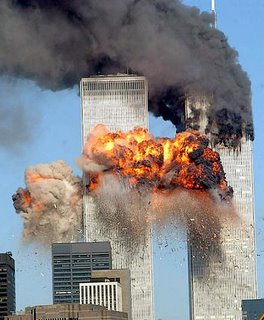
Readings: 1 Cor 5,1-8; Ps 5, 5-7.12; Lk 6,6-11
"Lead me in your justice, Lord," we ask in today’s Psalm response (Ps 5,8). The Psalmist also sings: "For you, O God, delight not in wickedness; no evil man remains with you" (Ps 5,4). Indeed, it is appropriate to call to mind the Lord’s justice on this fifth anniversary of 9/11. The Lord our God is just in all his ways. More importantly to us sinners, God is merciful. We certainly ask God’s mercy to be upon those who perished in the unspeakably evil attacks on the Twin Towers, the Pentagon, and the third plane that crashed in a field in Pennsylvania. We ask God’s healing mercy to be with those wives, husbands, children, mothers and fathers, sisters and brothers, and close friends who lost loved ones on that horrible day. But, in light of our faith, which finds its perfect expression in the teachings of Jesus Christ, what should our attitude be toward those responsible for these attacks? Their wicked acts are to be condemned without a doubt, but what about our attitude to those who mean us harm, our enemies? This question is not asked, like Jesus’ questions in today’s Gospel, rhetorically, with the answer being obvious. Neither is it asked in order to receive a ready-made answer; it is asked as a question for each of us to ponder in our hearts this day on which we remember a horrible evil perpetrated by human beings upon other human beings, as we ponder "man's inhumanity to man."
A key to a Christian response to these questions is contained in our Gospel this morning. As with Saturday's Gospel, Jesus is violating Jewish Sabbath observance by healing a man with a withered hand. Prior to doing this, our Lord asks the Pharisees, "is it lawful to do good on the sabbath rather than to do evil, to save life rather than to destroy it?" It is easy to imagine Jesus asking this question and waiting for a few awkward moments for a reply, while the Pharisees shuffled around, looked at their feet, and mumbled. In this instance he receives no reply. So, he goes ahead and heals the man’s withered hand (Lk 6,9-10). Like all the words and actions of our Lord, there are many lessons to be drawn from this episode, especially from his questions. Let us consider just two. Let us first consider his question about the lawfulness of doing good rather than do evil on the Sabbath. For the disciple of Jesus it is obligatory always and everywhere to do what is good and avoid what is evil. The second point is that, life being sacred, we are always obliged to save life. In other words, we are to be healers.
In order to heal we have to be healed. To be healed, in each of our cases, means to be forgiven. In order to be forgiven, we must forgive. To forgive requires mercy. In his Sermon on the Mount Jesus tells us, "Blessed are the merciful, for they will be shown mercy" (Matt 5,7). It is important to note that mercy does not cancel out justice. Because it does not sometimes in our fallen and sinful world justice requires resorting to the use of force. Our Lord tells us in his rhetorical question to the Pharisees it is better to save life than to destroy it. In the context of 9/11 and its aftermath, we must keep in mind that the ultimate goal of just war is to re-establish peace. More specifically, the peace established after the war must be preferable to the peace that would have prevailed if the war had not been fought. What this reinforces is that vengeance, which Paul, in concert with the Psalmist, tells us in Romans, is the Lord’s (Rom 12,19 ), plays no part in the Christian response to any evil, even one as horrific as the 9/11 bombings.
Regardless of where we stand with regard to certain "hot button" issues we know that peace and mercy begin with us. Therefore, we must practice both daily in all of our interactions, in our homes, in our places of work, and here in our parish, which should be a model of true justice brought about by mercy and resulting in peace. Because we have freely chosen to follow the way of the Lord Jesus, we are committed to acting intentionally in our efforts to adhere to the objective standards of morality clearly taught us by him. In other words, we obey Jesus because we love him (Jn 14,15 ). If our love for God is genuine, it leads to love of neighbor. Our neighbor, of course, is every person. Acting intentionally means knowing what our motives are. It also means knowing what our motives should be. This, in turn, requires us to pray, work, and cooperate with God so as to bring our will and our desires into conformity with Christ’s teachings.
So, while our faith enables us to discern what is good and what is evil, it also teaches us that we are sinners, who have done evil ourselves and who have been forgiven. God’s justice was satisfied in the act of ultimate mercy; Jesus Christ nailed to the Cross for our sins. Of all people, Christians understand that we must be merciful because we have received mercy. In a few moments we will pray the Our Father, the prayer taught us by our Lord himself. In this prayer we will ask God to forgive us our trespasses as we forgive those who trespass against us. Scripture tells us, "judgment will be without mercy to anyone who has shown no mercy; mercy triumphs over judgment" (Jas 2, 13). Let these reflections be the background against which we consider the questions raised by justice and mercy on this day during which remember so great an evil.


No comments:
Post a Comment